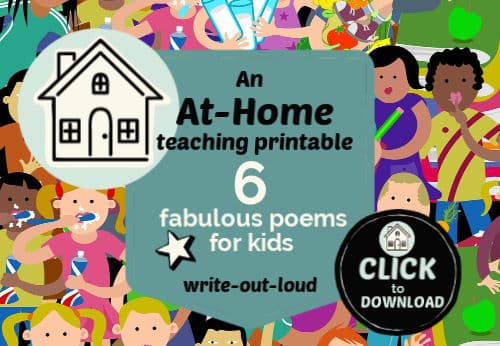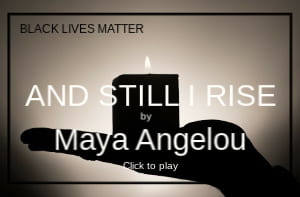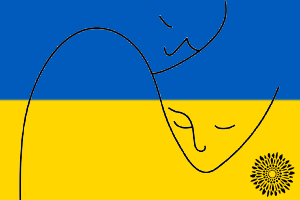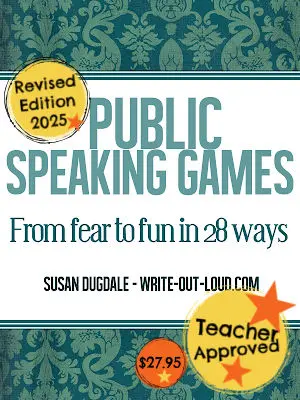- HOME ›
- Public speaking activities and games ›
- Poems for kids
Poems for kids
6 fabulous classic children's poems to play with
By: Susan Dugdale
Here's a collection of 6 superbly wonderful poems for kids, of all ages, to play with. They're perfect for at-home teaching.
My father read them to me as a child. I, in turn, read them to my son and, when I was teaching, I taught them in my classes.
They continue to endure, and delight. We love them for their exuberant joyful nonsense and the intoxicating whiff of topsy-turvy rebellion, naughtiness and magic they bring.
Break out the parlor poems!
Read them aloud.
Read them as duets, trios, or as a chorus. Add costumes.
Perform them live. Record them to share with friends and family.
Savor the language. Find the rhythms. Play. In short, have fun with them.
Get the printable. Listen to the audio.
You'll find a printable of all six poems to download at the foot of the page.
I recorded each of them too. The link to my audio is below each poem.
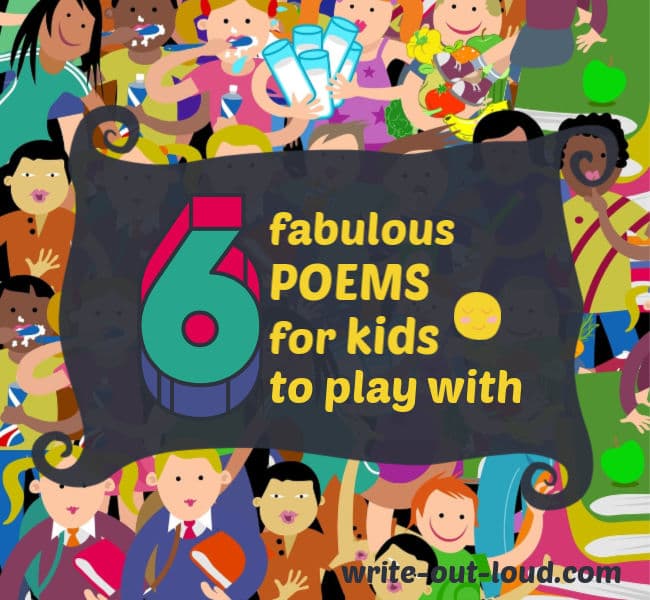
1. On the Ning Nang Nong
This is a nonsense poem by much loved Irish-British comedian and poet Spike Milligan. It first appeared in a collection of poems called "Silly Verse for Kids" published in 1959.
It appeals because it is, ridiculous. Cows don't go "Bong". Trees don't "Ping". Monkeys don't say "Boo". Mice don't "Clang". And teapots definitely do not "Jibber Jabber Joo".
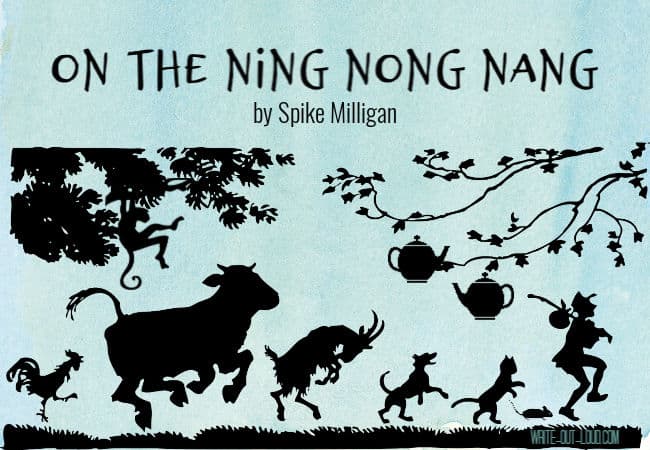
People sitting around a table having a cup of tea might "jabber": talk a lot. They might even "jibber": be nervous as they talk but their teapot? Never.
That aside, it's fun to suspend reality and pretend they do.
And the words: bong, ping, boo, clang, and jibber jabber joo are satisfyingly good to say. That's because they are all onomatopoeic. Their meaning is hinted at, or heard, in the way the word is pronounced.
How to work with the poem
This poem adapts well to group performance for people of all ages.
You could split it so one person narrates, while others say the sound words: bong, ping etc.
Or you could allocate lines and/or sounds around your group, either singly or in pairs, and then all come together for the last line.
Play as the inspiration strikes you. Don't be frightened to experiment.
If you find you're got a group of people who can't agree about direction, then give them all a turn to give it their creative best.
On the Ning Nang Nong
Where the Cows go Bong!
and the monkeys all say BOO!
There’s a Nong Nang Ning
Where the trees go Ping!
And the tea pots jibber jabber joo.
On the Nong Ning Nang
All the mice go Clang
And you just can’t catch ’em when they do!
So its Ning Nang Nong
Cows go Bong!
Nong Nang Ning
Trees go ping
Nong Ning Nang
The mice go Clang
What a noisy place to belong
is the Ning Nang Ning Nang Nong!
For more about Spike Milligan, here is an obituary published by the UK Guardian.
Listen to Ning Nang Nong.
2. Jabberwocky
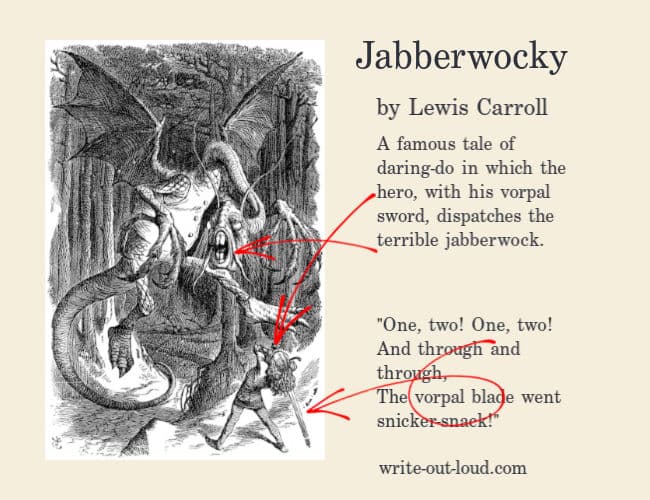
This is another glorious excursion into a make believe world; a tale, chock full of delicious nonsense words, about how a valiant hero defeats a terrifying monster.
Jabberwocky is a romp from beginning to end. We interpret the nonsense words as we see fit, roll with its rhythms while relishing Lewis Carroll's use of alliteration, assonance and consonance which makes the sound of the language so juicily satisfying.
The poem was first published in 1871, as part of the sequel to Alice's Adventures in Wonderland, Through the Looking Glass, and What Alice Found There. It's been a favorite of every generation since. (That fearsome creature in the image above is the original illustration by English illustrator Sir John Tenniel.)
Like Ning Nang Nong, Jabberwocky is incredibly versatile.
Read it solo. Turn it into a group performance. Devise SFX* to underpin the words. Split it into sections and allocate the parts around your group. Make a play, or a puppet show, of it with a narrator, hero, the hero's father, the jabberwock etc.
What happens if you say this part slow? Fast? Loud? Soft? As if you are angry, a news broadcaster, ...
Just play. Have fun with it. It's a poem and fortunately, poems don't bite or break. ☺
For more about Lewis Carroll.
*SFX (Sound Effects) Sounds that add 'color' or depth to the poem. When I've worked with classes we kept our SFX simple: hand clapping, foot tapping, thigh slapping, hand rubbing sounds, shhhhhhh sounds for wind, repeated b-b-b-b, t-t-t-t etc sounds, animal sounds ... If you have a group of three or more people, at least one could be your SFX expert.
And now here's the poem -
’Twas
brillig, and the slithy toves
Did
gyre and gimble in the wabe:
All
mimsy were the borogoves,
And
the mome raths outgrabe.
“Beware
the Jabberwock, my son!
The
jaws that bite, the claws that catch!
Beware
the Jubjub bird, and shun
The
frumious Bandersnatch!”
He
took his vorpal sword in hand;
Long
time the manxome foe he sought—
So
rested he by the Tumtum tree
And
stood awhile in thought.
And,
as in uffish thought he stood,
The
Jabberwock, with eyes of flame,
Came
whiffling through the tulgey wood,
And
burbled as it came!
One,
two! One, two! And through and through
The
vorpal blade went snicker-snack!
He
left it dead, and with its head
He
went galumphing back.
“And
hast thou slain the Jabberwock?
Come
to my arms, my beamish boy!
O
frabjous day! Callooh! Callay!”
He
chortled in his joy.
’Twas
brillig, and the slithy toves
Did
gyre and gimble in the wabe
All
mimsy were the borogoves,
And
the mome raths outgrabe.
Listen to Jabberwocky
3. Sneezles
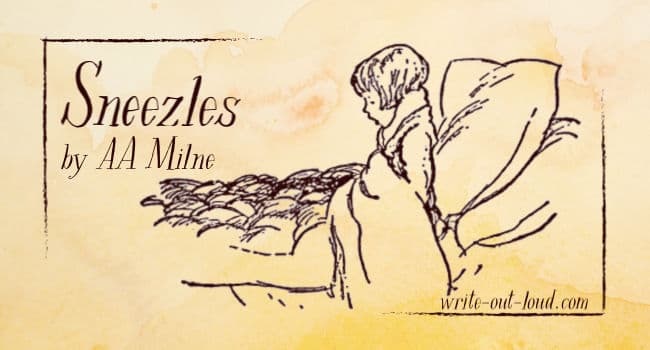
Sneezles comes from English poet AA Milne's book of children's poems Now We Are Six published in 1927.
Again this is a poem which plays with sound. There's the repetition of wheezle and sneezle as well as their similar sounding variations: teazle, pleaszle, reazles, measles, breezles, freezles and phtheezles.
Along side that the rhythm and rhyme bounces us through the story of how Christopher Robin feigned illness to get attention. We feel the urgency his parents feel, as they try to work out what is wrong, and resort to getting specialists in.
Although the poem uses "nonsense" words we understand them because they are not very far removed from real ones. Eg. reazles and reasons, teazle and tease. Even phtheezles is believable as the name for a serious disease.
Try it out loud. Use the punctuation to help with delivery.
Where a line has none it "wraps around" or "flows into" the next. The technique is called enjambment. When you say the first line, the one without punctuation, you don't pause before you begin the second. Instead you indicate the beginning of the second line with your voice - a stress on the first word.
Experiment. You'll hear it and realize it pushes the pace along as the story escalates from a very common, not particularly serious complaint to the possibility of something much more.
For more about AA Milne.
Christopher Robin
Had wheezles
And sneezles,
They bundled him
Into
His bed.
They gave him what goes
With a cold in the nose,
And some more for a cold
In the head.
They wondered
If wheezles
Could turn
Into measles,
If sneezles
Would turn
Into mumps;
They examined his chest
For a rash,
And the rest
Of his body for swellings and lumps.
They sent for some doctors
In sneezles
And wheezles
To tell them what ought
To be done.
All sorts and conditions
Of famous physicians
Came hurrying round
At a run.
They all made a note
Of the state of his throat,
They asked if he suffered from thirst;
They asked if the sneezles
Came after the wheezles,
Or if the first sneezle
Came first.
They said, "If you teazle
A sneezle
Or wheezle,
A measle
May easily grow.
But humour or pleazle
The wheezle
Or sneezle,
The measle
Will certainly go."
They expounded the reazles
For sneezles
And wheezles,
The manner of measles
When new.
They said "If he freezles
In draughts and in breezles,
Then PHTHEEZLES
May even ensue."
Christopher Robin
Got up in the morning,
The sneezles had vanished away.
And the look in his eye
Seemed to say to the sky,
"Now, how to amuse them to-day?"
4. The Owl and the Pussycat
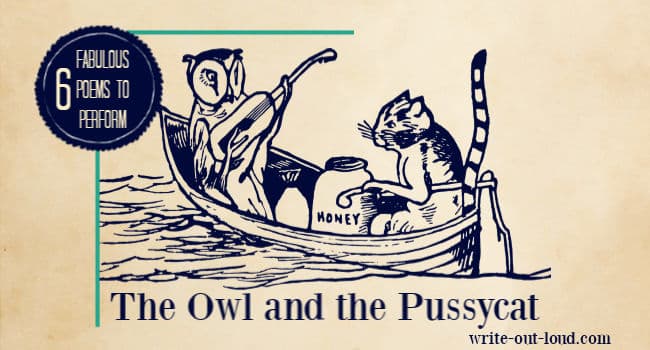
This poem brings us back to fully fledged, much loved nonsense!
Edward Lear's poem The Owl and the Pussycat has delighted people since it was first published in 1871. You'll find dozens, if not hundreds of versions of it. It's been set to music, filmed, parodied...
The Owl and the Pussycat is a romantic tale of true love. This unlikely pair sail away, leaving the real world behind "to the land where the Bong-tree grows". Between them they have everything they need: love, honey and money. Their happiness is made complete when they buy a ring from a pig, are married by the turkey who lives on the hill and dance "hand in hand on the edge of the sand by the light of the moon."
Again play with it.
Say it out loud. Listen for the rhythms, and the savor the sounds.
Try it solo.
Try it narrated with someone, or several people, picking up the pieces of direct speech ("O lovely Pussy ...", "You elegant fowl...", "Dear Pig ...", and "I will.")
Try it as a chorus work.
Try it with SFX of your own devising - gentle ooooh, aaah sounds, a beat ...
The image above is Edward Lear's original illustration.
Read more about English poet and painter Edward Lear.
The
Owl and the Pussycat
Went
to sea in a beautiful pea-green boat,
They
took some honey, and plenty of money,
Wrapped
up in a five pound note.
The
Owl looked up to the stars above
And
sang to a small guitar,
"O
lovely Pussy!
O
Pussy, my love,
What
a beautiful Pussy
You
are, you are, you are,
What
a beautiful Pussy you are."
Pussy
said to the Owl
"You
elegant fowl how charmingly
Sweet
you sing.
O
let us be married,
Too
long we have tarried;
But
what shall we do for a ring?"
They
sailed away, for a year and a day,
To
the land where the Bong-tree grows,
And
there in a wood a Piggy-wig
Stood
with a ring at the end of his nose,
His
nose, his nose,
With
a ring at the end of his nose.
"Dear
Pig,
Are
you willing
To
sell for one shilling your ring?"
Said
the Piggy, "I will"
So
they took it away,
And
were married next day by the Turkey
Who
lives on the hill.
They
dined on mince,
And
slices of quince,
Which
they ate with a runcible spoon.
And
hand in hand, on the edge of the sand they danced by The light of the
moon, the moon, the moon,
They
danced by the light of the moon.
Listen to The Owl and the Pussycat
5. What if

Whatif is American children's author, poet, songwriter and illustrator Shel Silsverstein's poem capturing the dreaded unanswerable night time worries.
The pace of the poem, set by rhyming couplets, is frenzied and frantic as the Whatifs large and small, ridiculous and real, tumble unbidden to "party all night long" in the speaker's mind.
The chaos pauses when an answer is finally given, then starts all over again.
I've found the poem useful when working with middle school and above, because of its humorous and accurate portrayal of the numerous anxieties besetting the age group.
Try it fast. Try it slow. Loud. Soft. Whispered. Shouted and all the variations in between.
Allocate lines. Decide on the shape of the sound. Does it build from very quiet to a crescendo? Does it ebb and flow? What is the tone? Mean? Kind ? Experiment.
For more see Shel Silverstein. Check the learning resources section. You'll find downloadable lessons and activities based on his poems.
Last
night, while I lay thinking here,
some Whatifs crawled inside my
ear
and pranced and partied all night long
and sang their
same old Whatif song:
Whatif I'm dumb in school?
Whatif
they've closed the swimming pool?
Whatif I get beat up?
Whatif
there's poison in my cup?
Whatif I start to cry?
Whatif I
get sick and die?
Whatif I flunk that test?
Whatif green
hair grows on my chest?
Whatif nobody likes me?
Whatif a
bolt of lightning strikes me?
Whatif I don't grow taller?
Whatif
my head starts getting smaller?
Whatif the fish won't
bite?
Whatif the wind tears up my kite?
Whatif they start a
war?
Whatif my parents get divorced?
Whatif the bus is
late?
Whatif my teeth don't grow in straight?
Whatif I tear
my pants?
Whatif I never learn to dance?
Everything seems
well, and then
the night time Whatifs strike again!
Listen to Whatif
6. Ickle Me, Pickle Me, Tickle Me too
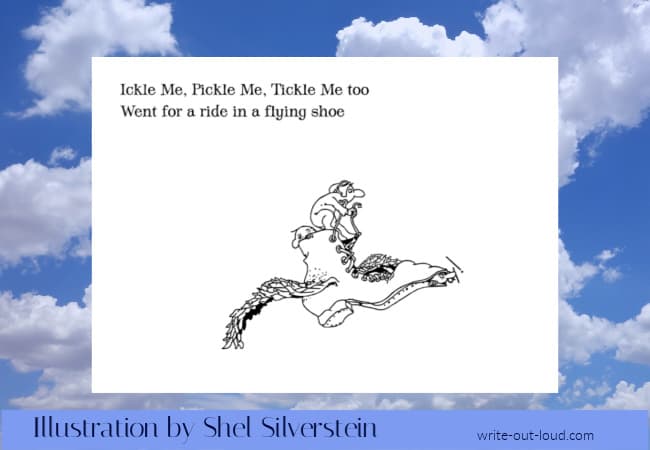
This is another gem from Shel Silverstein - the whimsical adventure story of three friends, Ickle Me, Pickle Me and Tickle Me, who go flying in a shoe. Alas, they never return to the land that they knew.
Do check out Shel's own magical rendition of it here: 6 animations of stories and poems by Shel Silverstein
And please don't let his interpretation stop you from finding your own way to share the story.
Instead be inspired. Go ahead and have fun.
Ickle
Me, Pickle Me, Tickle Me too
Went for a ride in a flying
shoe.
"Hooray!"
"What fun!"
"It's
time we flew!"
Said Ickle Me, Pickle Me, Tickle Me too.
Ickle
was captain, and Pickle was crew
And Tickle served coffee and
mulligan stew
As higher
And higher
And higher they
flew,
Ickle Me, Pickle Me, Tickle Me too.
Ickle
Me, Pickle Me, Tickle Me too,
Over the sun and beyond the
blue.
"Hold on!"
"Stay in!"
"I
hope we do!"
Cried Ickle Me, Pickle Me, Tickle Me too.
Ickle
Me, Pickle Me, Tickle too
Never returned to the world they
knew,
And nobody
Knows what's
Happened to
Dear
Ickle Me, Pickle Me, Tickle Me too.
Listen to Ickle Me, Pickle Me, Tickle Me too
7. About Socks
Just one more for good measure.
This is Dr Suess's almost-impossible-to-get-right-without-an-enormous-amount-of-effort tongue twister, About Socks.
Despite torturing and tangling tongues, it is fun.
Give
me the gift of a grip-top sock,
A clip drape shipshape tip top
sock.
Not your spinslick slapstick slipshod stock,
But a
plastic, elastic grip-top sock.
None of your fantastic slack
swap slop
From a slap dash flash cash haberdash shop.
Not a
knick knack knitlock knockneed knickerbocker sock
With a
mock-shot blob-mottled trick-ticker top clock.
Not a supersheet
seersucker ruck sack sock,
Not a spot-speckled frog-freckled
cheap sheik’s sock
Off a hodge-podge moss-blotched
scotch-botched block.
Nothing slipshod drip drop flip flop or
glip glop
Tip me to a tip top grip top sock.
Listen to me stumble through About Socks. ☺
More at-home resources and printables
Seven tongue twister games - instructions and printable to download. Suitable for all ages.
40 image starters or picture prompts for impromptu speaking and story telling activities. Adaptable for all ages.
For more check this page: speech/public speaking activities
PS.If you're unsure about how to approach reading poetry out loud start with this page. It will help: how to read poetry aloud.
